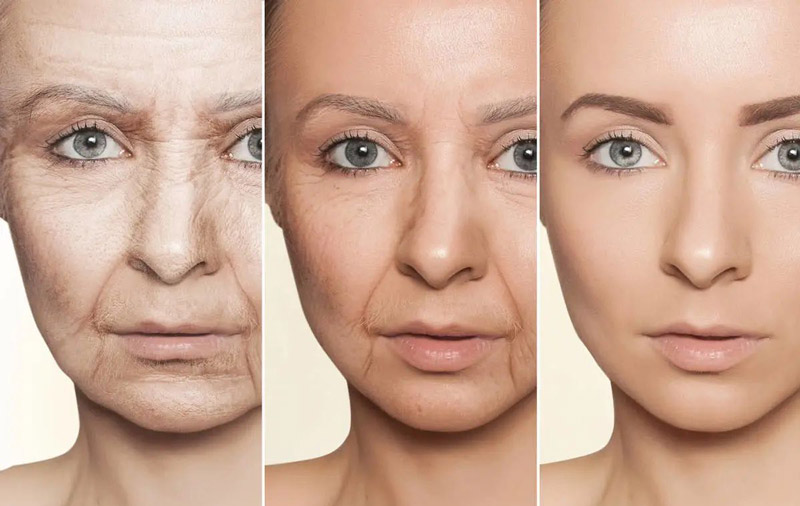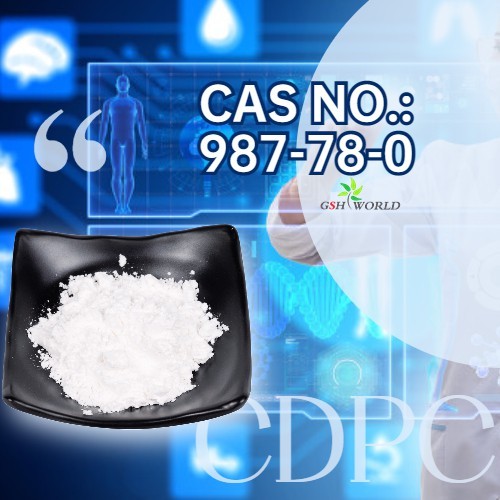Tight and fair skin is a lifelong pursuit for many girls. Why do some girls look 10 years younger than their peers, while others do the opposite.
We have written many articles on anti-aging, and have previously discussed the theory of glycation. AGEs are prone to aging, and in addition to them, there are also free radicals that can easily lead to aging.
Free radicals, like to cause damage everywhere in the human body, are closely related to aging and various diseases.
I have talked about antioxidants before, but exogenous antioxidants may not be very effective. Today, I will introduce a type of antioxidant in the body that is a natural enemy of free radicals.
It may really make you whiter, more beautiful, and younger, it's Glutathione.
Glutathione, some people may not be unfamiliar with it, and you may have seen it in the ingredient lists of health and skincare products.
Advertisements often promote its antioxidant activity, and people are willing to pay a high price to purchase it. What are its true benefits? How should we supplement? I hope this article can help you clarify your doubts.
Glutathione, an important antioxidant in the human body, is a genuine free radical harvester that can reduce damage caused by oxidative stress. It is mainly composed of three amino acids: glutamine, cysteine, and glutamic acid.
In cells, glutathione exists in two forms: reduced glutathione (GSH) and oxidized glutathione (GSSG). From the following structural formula, it can be seen that oxidized glutathione is actually the combination of two reduced molecules at the S atom.

The ratio of GSH to GSSG determines the redox state of cells. In a quiescent state, the ratio of GSH to GSSG in healthy cells is greater than 100, while under oxidative stress, the cell ratio decreases to 1-10.
The level of glutathione in the human body is influenced by various factors, including diet, environmental toxins, stress reactions, etc. Its content also decreases with age.
The benefits of glutathione
The important role played by glutathione in the body is countless. In fact, wherever free radicals are produced, it may be the battlefield it carries with it.
The functions of glutathione in the human body roughly include ↓:
Many common modern diseases are more or less related to excessive loss of glutathione, including:
Neurological disorders (Alzheimer's disease, Parkinson's disease, Huntington's disease, etc.)
Pulmonary diseases (asthma, acute respiratory distress syndrome, etc.)
Immune system diseases (AIDS, autoimmune diseases)
Cardiovascular diseases (hypertension, myocardial infarction, cholesterol oxidation)
Chronic geriatric diseases (cataracts, macular degeneration, hearing impairment, and glaucoma)
hepatopathy
Cystic fibrosis
Diabetes
In addition, the lack of glutathione may lead to the proliferation of free radicals and accelerate aging.
How effective is oral administration and injection of glutathione? In recent years, with people's pursuit of the external image of beauty, various whitening and slimming needles have become increasingly common. Glutathione, as a leader in the antioxidant industry, has become a popular figure in many beauty and skincare products.
Many people may see from TV commercials and health magazines that glutathione supplements can detoxify, nourish the skin, resist oxidation, and combat aging.
So, in order to supplement glutathione as quickly and conveniently as possible, they bought supplements to take, just like taking vitamins and pills, taking a few pills a day is very convenient.
However, studies have found that the effects of oral glutathione on the body are actually minimal, and there may also be some unknown safety hazards.
To talk about the whitening effect of glutathione, it is necessary to mention its relationship with melanin. Firstly, glutathione can indeed intervene in the formation process of melanin.
The key issue is that the bioavailability of exogenous glutathione in the human body is extremely low.
There was a randomized, double-blind clinical trial that divided 40 healthy adult volunteers into two groups.
Before the start of the study, there was no difference in oxidative stress biomarkers between the two groups. One group of volunteers took 500mg of glutathione supplement twice a day for four consecutive weeks, while the other group took a placebo orally as a control.
After the study, it was found that there was no significant change in the content of glutathione in the bodies of the two groups of members compared to before the experiment.
This indicates that taking glutathione supplements does not have a significant impact on oxidative stress and glutathione levels in humans.
Conclusions:
No significant changes were observed in biomarkers of oxidative stress, including glucose status, in this clinical trial of oral glucose supplementation in health adults
Another study tested the concentration of glutathione in the blood of 69 white males and females before and after taking glutathione. The daily intake of glutathione ranged from 13 to 109.9mg (average 34.8mg).
The results showed a weak negative correlation, and after consuming foods containing glutathione, the concentration of glutathione in the blood may actually decrease.
This study may not prove anything, but at least it indicates that the concentration of glutathione is the result of many factors working together, and it is not simply replenished by consuming it.
The specific reason may be related to the breakdown of glutathione during absorption and metabolism.
In addition, besides its low bioavailability, the safety of long-term human intake of high-dose glutathione has not been studied, which further increases a safety hazard.
Therefore, overall, the significance of oral glutathione supplements is not significant.
Some people may ask, if taking supplements is not effective, then injecting glutathione directly into the bloodstream can achieve 100% utilization, right?
Unfortunately, our bodies seem to be a bit resistant to exogenous glutathione. Even if injected directly into the bloodstream, it will be broken down by enzymes on the cell surface, and so far, no transporters of glutathione have been found.
Many online sales of glutathione may not have safety guarantees and may cause a series of problems such as infections and allergies.
The US Food and Drug Administration (FDA) has issued a safety warning for high-dose injections of glutathione, stating that injections, including glutathione, may contain unknown harmful ingredients and lack safety guarantees, and should be used with caution.
Consumers need to beware of products to lighten or whiten their complexion. These products, which include both injectable skin whitening and skin bleaching products, are potentially unsafe and ineffective, and might contain unknown harmful ingredients or contaminants.
Although the average consumer might not assume so, these products are unapproved new drugs whose sales are not condoned by the U.S. Food and Drug Administration (FDA). The FDA has not approved any injectable drugs for skin whitening or lightening.
The products sold by Flawless contain ingredients, including glutathione, vitamin C, collagen and even human placenta.
However, a study on glutathione whitening cream seems to have some effects.
The study investigated the skin condition of 30 healthy Filipino women for 10 weeks, mainly observing changes in the following parameters: skin elasticity, smoothness, stratum corneum moisture content, and melanin index.
The results showed that the melanin index of the group using glutathione face cream was significantly lower than that of the control group. In the later stage, the skin was smoother and the water content was higher.
If oral administration and injection do not work, are there any other methods?
How to supplement glutathione? Since foreign glutathione is difficult for the body to absorb and utilize, can we only watch it slowly flow away and be powerless?
Firstly, we need to know that when free radicals are produced, cells regulate the production and content of glutathione based on the levels of oxidative stress both inside and outside the cell.
To supplement glutathione, one should adhere to the principle of assisting the body and optimizing cell production, and incorporate a healthy diet and lifestyle,
Instead of just injecting glutathione into the bloodstream, this may disrupt the production order of natural glutathione.
Considering this, when we talk about how to supplement glutathione, "how to optimize the production of glutathione" may be a more precise statement.
What is consuming your glutathione
To increase glutathione levels and minimize losses, it is far more important than finding ways to supplement them, and it is often easier to do so.
This is like a reservoir that allows water to flow in and out at the same time. If you want more water, you should first try to reduce water loss as much as possible and know how to open the source and regulate the flow in order to help cells efficiently produce glutathione.
Throttling means reducing consumption. In other words, it means not letting glutathione do too much work, so as not to squeeze it dry.
Generally speaking, there are two main factors that contribute to the consumption of glutathione in the body, including intrinsic and extrinsic factors.
Internal factors, such as the recycling and utilization of vitamin C and vitamin E, DNA repair, etc., all consume glutathione. However, this is a normal metabolism in the human body that we may not be able to avoid.
The main reason for consuming glutathione is external factors. When we come into contact with many toxic and harmful substances, we need glutathione to detoxify them, including ↓:
Oxidative stress related to free radical production consumes glutathione, and as healthy adults age, the annual production of glutathione naturally decreases.
Although it is impossible to completely avoid toxic substances in the environment, we can still reduce consumption as much as possible by changing daily habits.
→ Supplementing through diet
We have achieved the goal of "cutting costs", and we can also help it "open source" through diet.
Foods rich in sulfur
Sulfur is an important mineral in the human body, found in many natural plants and animals. It is an important raw material for synthesizing glutathione. Therefore, supplementing sulfur can promote the body's synthesis of more glutathione.
Sulfur mainly comes from foods rich in protein, such as beef, poultry, and fish
Of course, if you are a vegetarian, you can also choose some vegetarian options to supplement sulfur, such as cauliflower, kale, watercress, and mustard.
Many studies have found that eating foods rich in sulfur can supplement glutathione, thereby reducing oxidative stress.
In addition, onions, garlic, and onions can also increase glutathione levels, possibly due to their sulfur-containing compounds.
To supplement sulfur, it is also possible to consider supplementing with methylsulfonylmethane (MSM), which is beneficial for promoting the synthesis of glutathione. Before purchasing, consult a doctor.
α- Lipoic acid
α- Lipoic acid is a powerful antioxidant produced by human cells, which can reduce the workload of glutathione, increase the level of mitochondrial glutathione, and facilitate the transformation of glutathione from an oxidized state to a reduced state.
α- Lipoic acid can improve the transportation and metabolism of glucose, reduce blood sugar, and help control diabetes.
Like glutathione, α- When lipoic acid is subjected to heavy pressure or exposure to toxic substances, it generates free radicals and is consumed and utilized.
Some foods contain small amounts α- Lipoic acid, such as red meat, animal organs (especially liver), broccoli, tomatoes, peas, etc.
However, α- The content of lipoic acid in food is very low, and even high content foods are much lower than supplements. Supplements can also be considered, but if considering supplements, be sure to consult a doctor before taking them.
selenium
Selenium is an essential mineral that participates in protein synthesis and other metabolic processes. It also works in conjunction with other antioxidants, especially vitamin E. Eating more selenium containing foods can maintain or increase the content of glutathione.
The recommended daily intake for adults is 55 micrograms, and the best dietary sources include Brazil nuts, fish, beef, chicken, sunflower seeds, etc.
Foods rich in glutathione
Some foods themselves contain glutathione, such as asparagus, avocado, okra, broccoli, etc. However, when consumed, their effects are similar to supplements, and the human body will decompose them with low bioavailability.
Although these foods have little effect on cellular glutathione levels, they may still be beneficial to the body.
For example, a survey involving 1830 participants showed that glutathione foods may reduce the risk of oral cancer
In addition, other foods can also help increase glutathione levels, such as spices such as turmeric, cinnamon, and cardamom, and sugar beets can also enhance the activity of glutathione enzymes.
Whey protein supplement
Cysteine is an important amino acid in the synthesis of glutathione, and whey protein is rich in cysteine, which may increase the synthesis of glutathione and reduce oxidative stress damage.
High quality non denatured whey protein retains the original biological activity of cysteine, ensuring high-quality production of glutathione and is a good method to improve glutathione levels.
Vitamin C
Many vegetables and fruits are rich in vitamin C, such as sweet peppers, kiwifruit, citrus, papaya, strawberries, etc. Mammalian organs and fish seeds also contain vitamin C. (Related reading - Why do Inuit people who only eat meat and don't eat vegetables not suffer from scurvy?)
Vitamin C itself, as an antioxidant, can help cells avoid oxidative stress damage and also help maintain levels of other antioxidants in the body, including glutathione.
Avoid excessive drinking
As is well known, alcohol not only harms human health, but also poses significant safety hazards to society. Various incidents related to drunk driving and drunk injury have been repeatedly reported.
Long term heavy drinking can lead to alcohol dependence, similar to drug consumption, making it difficult for many people to get rid of.
Alcohol abuse is associated with many chronic diseases, such as liver cirrhosis, brain injury, and pancreatitis.
Research has found that people who frequently drink alcohol have a 80-90% decrease in glutathione in the alveoli, a serious deficiency that may be related to long-term chronic oxidative stress.
Smoking and drinking may be the main causes of rapid aging, and staying away from alcohol means staying away from drugs and chronic harm.
Good sleep and regular exercise
The health benefits of good sleep and exercise go without saying, and they should become regulars of a healthy lifestyle.
Exercise can enhance the body's antioxidant function and increase glutathione levels.
A study comparing 30 insomnia patients with 30 healthy individuals found that the activity of glutathione peroxidase was significantly reduced in insomnia patients.
For those who stay up late for a long time and suffer from severe sleep deprivation, they must be careful
Glutathione is an important antioxidant in the human body, which is constantly consumed by stress, poor diet, aging, and toxic substances in the environment.
It may have some moisturizing and whitening effects when applied to the surface of the skin, but some supplements and injections are easily decomposed and have low utilization after entering the human body.
Moreover, the safety of high-dose use is also unknown, so it is recommended that everyone use it less or not.
Since its natural production can only occur within cells, we can compensate for its loss through healthy diets and lifestyles.
Foods rich in sulfur and selenium, as well as whey protein, are important sources for synthesizing glutathione. We can increase its synthesis by supplementing the body with raw materials.
Through good food and a healthy lifestyle, we can all become good helpers to our bodies.






